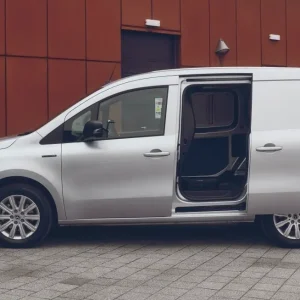With the uncertainty caused by the lack of progress in the Brexit negotiations gripping the business community, Volkswagen Commercial Vehicles is striving to create a more secure environment for its customers.
“Customers don’t have the certainty they would like,” claimed the brand’s director Carl zu Dohna. “So we need to supply stability,” a quality, he adds, that is a “hallmark” of the brand.
He points out that in an overall LCV market that fell for the second year running in 2018 Volkswagen was one of only two of the volume brands to post an increase in sales, albeit of a modest 1.7% to 42,164 units, according to Society of Motor Manufacturers and Traders (SMMT) figures, compared with market leader Ford’s more substantial rise of 7.0%.
Volkswagen took a market share of 11.8% last year, which zu Dhona said is in line with its planned retail strategy.
The performance of the models across the line-up remained steady. Volkswagen sold 11,599 Caddy light vans last year, which was down slightly from the 12,580 registered in 2017 and a further drop from the 14,533 shifted in 2016.
Head of fleet David Hanna said the fall was largely down to British Gas being in mid-cycle with its fleet of Caddys and not requiring replacements last year.
Volumes of the brand’s biggest seller, the Transporter, reached 25,460 in 2018, marginally behind the previous year but ahead of 2016.
The Amarok pick-up made a sizable leap from 2,931 to 3,443 last year as customers moved to get their hands on the new flagship V6 258hp engine but it could not quite match the 3,586 total reached in 2016.
The Crafter large van made a 24% jump to 6,467 units last year but notably did not match the 7,137 sales the previous-generation model recorded in 2016.
But having completed the roll-out of Crafter derivatives last year Volkswagen will hope to build on this total going forward.

Brand director Carl zu Dohna
A growing focus for the brand in the near future is on establishing a foothold in the electric van market, starting with the launch of the e-Caddy Maxi in the second half of 2018.
An e-Transporter and an e-Crafter are set to follow in 2020 and 2021, respectively. The 3.2t electric Transporter will be offered in long-wheelbase form only but with a choice of two batteries to cater for customers prioritising either payload or range.
The version with a 38.8kWh battery will cover a New European Driving Cycle (NEDC) rated 134 miles on a single charge but will offer a meaty payload of 1,186kg, while opt for the bigger 77.6kWh battery capacity and you get a range extended to 250 miles but a payload cut to 695kg. The load volume for both derivatives is 6.7m3.
Volkswagen sees the e-Crafter as a van for urban operators covering last-mile deliveries and thus requiring a range not likely to exceed 62 miles, although it quotes 107 miles on the NEDC cycle.
In another reflection of how the brand sees the e-Crafter as a strictly urban machine, the top speed is limited to 56mph.
It gets the 38.8kWh battery, and in core 3.5t medium wheel-base, high-roof mode comes with a 10.7m3 load space and 975kg payload.
Volkswagen claims a trial of left-hand drive e-Crafters in and around London has been a success and met the needs of the City of London Corporation, Southwark Council and Gatwick and Heathrow airports, which use the vans for limited mileage tasks.
The manufacturer says the appetite for electric vans is growing and to back up this claim cites a survey that found 70% of its customers are likely to buy an electric van in the future. Curiously, electric vehicle enthusiasm was higher among owner/drivers and SMEs than fleets. Volkswagen says this is because while smaller operators know electric power represents the future, large fleets have more awareness of the current limitations of the technology and of the difficulties in incorporating the vehicles into their operations.
Electric vans cannot yet replace diesel and petrol in all applications and apart from payload, efficient charging presents the biggest obstacle.
To address this Volkswagen set up the Elli energy and charging business in 2018 to help its customers make the transition to electric vehicles, covering everything from charging boxes to tariffs to load management.
“It will make it easy for customers to roll out EVs,” said Hanna and in these tough times, easing the customer burden is the name of the game for Volkswagen.





